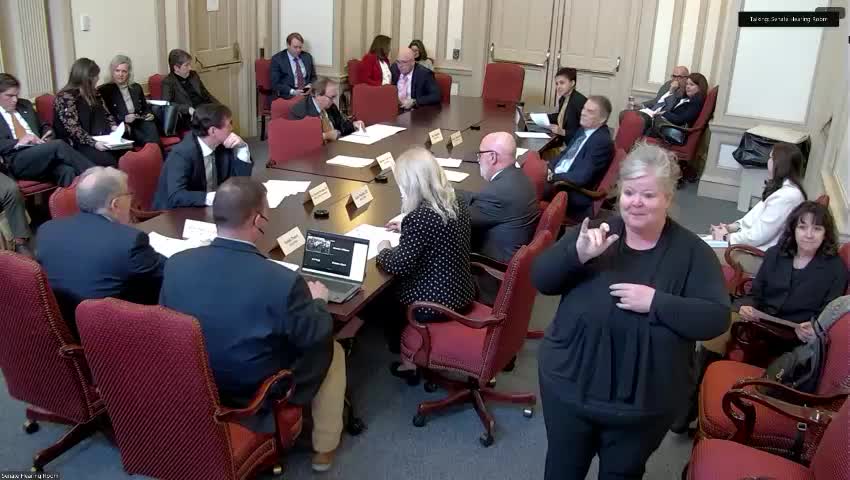Committee hears bill to expand use of Delaware telecommunications fund for deaf and hard‑of‑hearing supports
Get AI-powered insights, summaries, and transcripts
Subscribe
Summary
Senators on March 26 heard House Bill 53, which would broaden allowable uses of Delaware’s telecommunications fund to purchase modern assistive devices for deaf, hard‑of‑hearing, deaf‑blind and speech‑disabled residents, and would cap administrative spending at 15%.
The Senate Banking, Business, Insurance and Technology Committee on March 26 heard House Bill 53, sponsored by Representative Morrison and carried in the Senate by Senator Lachman, which would expand how the state’s telecommunications fund for deaf, hard‑of‑hearing and speech‑disabled residents may be used.
Senator Lachman told the committee the bill responds to advocacy that the existing fund—sourced from a small fee on phone bills—has accumulated an unused balance because current regulations restrict eligible purchases to a narrow set of (often outdated) devices. He said the bill would authorize purchases of modern assistive equipment such as visual alarm clocks, vibrating baby monitors, doorbells and smoke detectors designed for people with hearing loss, amplified or hearing‑aid‑compatible phones, and emergency‑response kits tailored to hearing‑related needs. The sponsor said the change would allow the division to reclassify one staff position to manage the expanded program and would not require a new fiscal note.
Under the bill text discussed in the hearing, administrative costs would be limited to no more than 15% of annual fund revenue, the program would maintain a reserve equal to at least three months of expected expenses, and the division would submit an annual report by Sept. 30 to stakeholders.
Rachel Toney, identified in the hearing as deputy secretary for the Department of Labor, spoke as a witness and described agency cooperation with the bill sponsors and advocates. Committee members asked several implementation questions: how the 15% administrative cap would be used (for a reclassified position and to cover additional accounting/procurement costs), whether Medicaid or other payers already cover some items, and whether the fund could be used to help employers adapt workplaces. Department witnesses said some items may be covered by Medicaid for certain recipients but that many people who need the equipment are not Medicaid recipients; they also said workplace accommodations are not the primary intent of the fund and that vocational rehabilitation already supports employment‑related placements and consultations.
Public commenters representing disability advocacy and health organizations testified in favor. Vita Fernsler, president of the Delaware Association of the Deaf, said that appropriate alarm clocks and specialized fire alarms can cost substantially more than mainstream consumer devices and described the bill as a way to make critical equipment affordable for independent living. Christina Brian of the Delaware Health Care Association also voiced support, saying the equipment can keep Delawareans safer and reduce hospitalization risk.
No committee vote on House Bill 53 was recorded in the transcript; committee members asked the sponsors and agency to provide follow‑up information on overlaps with Medicaid and to track the program’s regulatory implementation.
